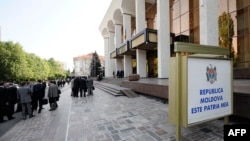Moldova's parliament voted in legislator and businessman Valeriu Strelet as prime minister by the slimmest of margins on Thursday and approved his pro-Europe government after he pledged to try to extricate the country from financial crisis.
A three-party, pro-European Union alliance, which holds a slender majority in the 101-seat assembly, mustered the 52 votes needed to secure Strelet's approval in the 101-seat assembly.
The post of prime minister has been vacant in the former Soviet republic since June 12, when Chiril Gaburici stepped down after just over 100 days in office following allegations that his school diplomas were fake.
Strelet, 45, outlining his program to parliament, referred specifically to the disappearance of $1 billion from the banking system - roughly equivalent to one eighth of Moldova's gross domestic budget - through loans to unidentified recipients.
Sandwiched between Ukraine and EU member Romania, Moldova, which has a population of 3.5 million, embarked on a pro-Europe course in 2009 despite its reliance on Russian energy supplies and the presence of a pro-Russian, self-proclaimed statelet called Transdniestria within its borders.
But it has continued to be dogged by economic mismanagement and corruption.
Missing Cash
In one of Europe's poorest countries, where the average salary is $200 a month, the banking scandal brought thousands out on to the streets in protest and cast a shadow over its pro-Europe leaders' record in office.
The crisis around the missing cash and the political instability it has generated are holding up assistance from the International Monetary Fund and other lenders.
Strelet, speaking before the vote, said he and his government team were "firmly determined to redress the situation and move the country forward."
Economic turbulence in Russia, Moldova's main trading partner, has added to its woes, with the national currency losing 40 percent of its value against the dollar this year.
Earlier on Thursday, the central bank raised its main interest rate to 17.5 percent from 15.5 percent in a further bid to control inflation - the fifth rate increase this year.
In June, inflation reached 8.3 percent year-on-year against a central bank target of 5 percent. A three-party Alliance for European Integration composed of liberal democrats, liberals and democrats kept their slender majority in an election last November despite a strong showing by the socialists, who favour close economic ties with Russia rather than with the EU.
But the country plunged almost immediately into crisis as it emerged that $1 billion had disappeared from Banca de Economii, Banca Sociala and Unibank.
Strelet, who runs a fertilizer import company, emerged as a compromise candidate after the initial choice, former education minister Maia Sandu, divided the coalition by demanding the dismissal of the state prosecutor and the head of the national bank as her price for taking the job.





